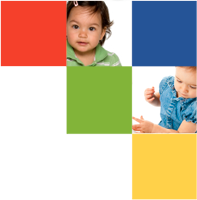Your Child at 18 to 24 Months
 As your child grows they continue to become their own person. Their sense of independence is growing as they starts to walk, run and climb with greater ease.
As your child grows they continue to become their own person. Their sense of independence is growing as they starts to walk, run and climb with greater ease.
This is a wonderful time to help your child's rapidly growing vocabulary by talking to them about everything and reading together every day.
At 18 to 24 months old your child will be able to:
- Walk well and run, though they may not always stop and turn well
- Toss or roll balls
- Enjoy moving on small wheeled riding toys
- Feed them self with a spoon
- Begin to gain some control over bowels and bladder
- Refer to self by name and use the words "me" and "mine"
- Copy single words spoken by someone else
- Use the words "please" and "thank you" if prompted
- Choose between two objects
- Enjoy humming or singing familiar songs
- Use 2 to 3 word sentences
- Imitate actions
- Get angry and may even have temper tantrums
- Act shy around strangers
- Have trouble sharing
- Show signs of independence, like saying "no"
If you have concerns about your child's development, contact Early On at 1-800-EarlyOn or 1-800-327-5966.
Discipline and Your Toddler
Discipline means to teach, not punish. As your toddler grows, it will be important to help your child cooperate by setting consistent limits, providing a safe environment in which to explore, and being realistic with your expectations.
There are many methods to deal with difficult "testing" behaviors including redirection, time-outs, and praising good behavior. The most important thing is to know what to expect from your child at each age and stage. Doing so will eliminate the possibility that you are expecting too much or too little from your child.
Visit these sites to review articles about effective discipline.
Baby Those Baby Teeth
Baby teeth are important for chewing, speaking, spacing of permanent teeth, and overall health. Click here for an interactive tooth wheel for children aged 1 month to 5 years.
Keep Them Safe
As your toddler grows, they will become more curious and independent. Visit Safe Kids for a list of ways to keep your toddler safe at home, at play, and on the go.
"Mommy, Is This Okay"
Your toddler is watching your face and learning from your expressions all the time. They are learning the important skill of how to read faces and emotions. Check out these websites about fostering this important skill in your child:
Let's Play
Proving toddlers plenty of time to run and play can benefit not just their physical development, but their overall development as well, including building communication skills and self-confidence. Visit Zero to Three for information about the importance of play for your toddler.
